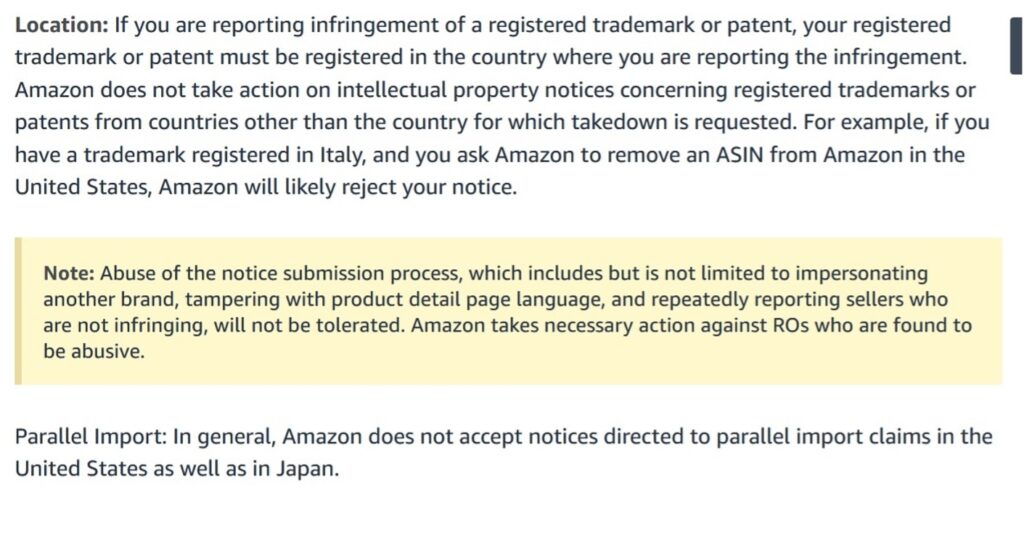Acts of torts by Amazon [Appendix 1-20]. Amazon’s claim that the use of ‘Cath Kidston’ is an Intellectual Property Infringement (trademark violation)
Amazon is selling Cath Kidston items contrary to the purpose of the Fair Competition Code (Article 31 of Act against Unjustifiable Premiums and Misleading Representations) and is imposing disadvantages on consumers.
[Claimant Note: Article 31 (1) An Entrepreneur or a Trade Association may, upon obtaining authorisation from the Prime Minister and the Fair Trade Commission pursuant to the provisions of Cabinet Office Order, with respect to the matters relevant to Premiums or Representations, conclude or establish an agreement or rules aimed at preventing unjust inducement of customers and securing general consumers’ voluntary and rational choice-making and fair competition between Entrepreneurs. The same applies in the event alterations thereof are being attempted.]The item which Amazon is selling not only constitutes a trademark violation as referred to on the previous page, but also consists of cosmetics (e.g. hand cream, body lotion, body wash) made abroad for which the Act on Securing Quality, Efficacy and Safety of Products Including Pharmaceuticals and Medical Devices (hereinafter called ‘PMD Act’) is applicable. Despite this, neither the product detail nor the ingredients contained in the cosmetics are provided in the catalogue. Moreover, although Amazon states that delivery takes 1-2 months, it is selling their item with the ‘Buy Box’ provided.
The Incorporated Administrative Agency National Consumer Affairs Centre of Japan issued the following warning to consumers: ‘When consumers purchase items using online shopping sites, there are cases where they place orders without knowing sellers are overseas businesses operators (border crossing providers) and the items are delivered directly from overseas without the intervention of domestic distributors’. Hence, it advises consumers to make a purchase decision only after thoroughly checking the explanations written on the online stores. In fact, UK Amazon, which is a group company for Amazon Japan, is selling the body care products of Cath Kidston and offers to deliver these items to Japan.
Amazon claims that its brand protection policy includes protections for consumers who purchase brand items and that ‘product detail’, including product explanations and pictures, is vital information that needs to be provided upon registering a product. Therefore, Amazon emphasises that it has the right to take immediate action for protection if a listing is inaccurate.
In the verdict regarding Amazon’s lawsuit brought against the Japanese Government, the court stated to Amazon that: ‘Consumers who consider purchasing can, in general, only obtain information by trusting the outline being displayed alongside the product’. It went on to state the following with respect to retailers selling on the internet: ‘In relation to the display of information for the item in question being sold on the internet by the retailers themselves, no legal provision exists for retailers such that they have no obligation to display the information complying with laws or are exempted from the obligation to display the information complying with laws’.
With respect to cosmetics distributed in Japan (including imported sales), having been accredited by the Japan Fair Trade Commission and the Head of the Consumer Affairs Agency, entrepreneurs or trade associations voluntarily set their own rules for matters in relation to display or premiums as the Code of Fair Competition – this is based on the rules and regulations of Article 31 of the Act against Unjustifiable Premiums and Misleading Representations. These rules are devised to protect the interests of consumers, such as accurately providing information necessary to choose products and services, and stipulating what should be displayed in advertisements and catalogues. Hence, these organisations state that they have an important role to play in creating an environment in which consumers can choose better goods and services safely. Nevertheless, these are rules established voluntarily – they are not applicable to entrepreneurs who do not participate in the Code. However, to address misleading representation or unjustifiable premiums conducted by entrepreneurs who do not participate, if the information necessary for choosing goods and services is not provided accurately and does not serve to protect the interests of consumers, the Consumer Affairs Agency takes measures based on the rules set out in the Act against Unjustifiable Premiums and Misleading Representations. The Consumer Affairs Agency states that it imposes strong punishments for such conduct, except for entrepreneurs or trade associations who fall under the Code of Fair Competition (Article 31, paragraph (5) of Act against Unjustifiable Premiums and Misleading Representations) which does not apply the Act on Prohibition of Private Monopolisation and Maintenance of Fair Trade (Antitrust Law).
That is to say, entrepreneurs which sell imported body care products subject to the PMD Act should display product information to ensure consumer protection. In fact, yodobashi.com, which sells Cath Kidston body care product ranges and is a competitor of Amazon, displays product details that are compliant with the PMD Act to enable consumers to make a purchase decision based on the information provided (see below).

Amazon itself is conducting acts of torts which fall under the policy violations of listings which should have been removed, and it is highly inappropriate for such a company taking this position to be running the Brand Registry. In Amazon.co.jp, those responsible for removing items listed by sellers as inaccurate and inappropriate are Amazon.com and their subordinate, the Legal Department of Amazon Japan. It is clearly unreasonable and impedes fair competition that no third party organisation exists which can claim acts of torts by Amazon and remove its listings.
Among sellers selling Cath Kidston items, Amazon.com (the US Amazon) targeted only the Claimant and removed a genuine Cath Kidston item from Amazon.co.jp which the Claimant had listed as parallel-imported to sell for the domestic market. They did so on the grounds that it constituted an Intellectual Property (IP) infringement (trademark violation), actions which contradict the Intellectual Property for Rights Owners on Seller Policies [Claimant Note: The Claimant had registered on Amazon.co.jp to sell only in Japan as Amazon claimed that they are the biggest online marketplace operator in 2013. She has never signed up for Global Selling which would allow her to sell on all Amazon websites worldwide. Amazon.com is claiming there have been IP infringement complaints from abroad regarding the Claimant, who has never made any agreement to comply with laws applicable in countries other than Japan in order to sell worldwide].
[Excerpt from the Intellectual Property for Rights Owners on Seller Policies]

Read about this in more detail: Claimant’s Brief 12 (pp.16-25)







